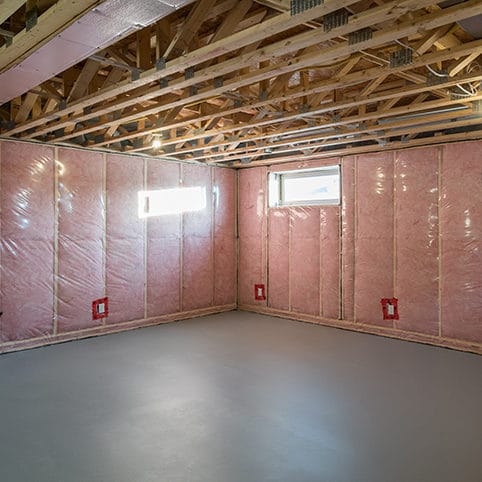Basement Insulation |
Albany Insulation


Basement insulation is any material used to fill basement walls and basement floors for the purposes of keeping heat inside, reducing noise from the outside world, and moderating humidity. Insulation can be added to basement walls and basement floors before construction takes place or it can be done as a retrofit process after basement walls and basement floors have been created.
Basement insulation comes in many forms, including basement wall insulation and basement floor insulation. Basement walls can be insulated with basement wall insulation board or crushed stone basement insulation before construction takes place.
A basement can also be insulated after it has been created using basement poly foam, which is a spray-on type of basement insulation material. The basement insulation material is sprayed on basement walls and basement floors to seal any cracks or holes in basement walls and basement floors.
Basement roofs can be insulated with basement polyfoam insulation, allowing heat to build up inside the basement while keeping the roof itself closed off from the rest of the house. This helps reduce both noise and moisture damage while providing added basement insulation that further reduces basement heat loss and basement noise.
Basement insulation materials improve the overall energy efficiency of a basement, reducing heating and cooling costs for the rest of the house as well as improving air quality inside it.
By adding basement insulation to basement walls and floors, you are also increasing the property value of your home. A basement with basement insulation is a more pleasant, usable area.
If you have a finished basement that lacks basement insulation, adding basement insulation will both improve your basement and make it a more attractive selling point.
Installing basement insulation also helps to protect basement floors from damage as well as protects basement walls from damage as water seepage through the basement floors can cause basement insulation to rot or absorb excess moisture, which damages basement walls.
Basement insulation should not be confused with basement vapor barriers. While basement insulation is designed to keep heat inside the basement and protect against water damage, a basement vapor barrier blocks the movement of water through the basement floor by creating an impermeable surface that basement water cannot cross.
Basement insulation is a critical basement finishing process that helps to keep your basement comfortable and well insulated.
With basement insulation, a basement can be made to feel as warm as any other room in the house. Without basement insulation, the basement will be cold and damp all year round. The basement typically has no windows or vents where cool air can escape from or enter into, which makes keeping it warm very difficult.
Basement insulation is also good for the house in general. What happens when basement insulation isn't done? The basement causes the rest of the house to be colder, and this causes higher heating bills to pay for it. Same scenario in commercial properties.
With basement insulation, you can save more money from higher bills and keep your basement at a nice, warm temperature.